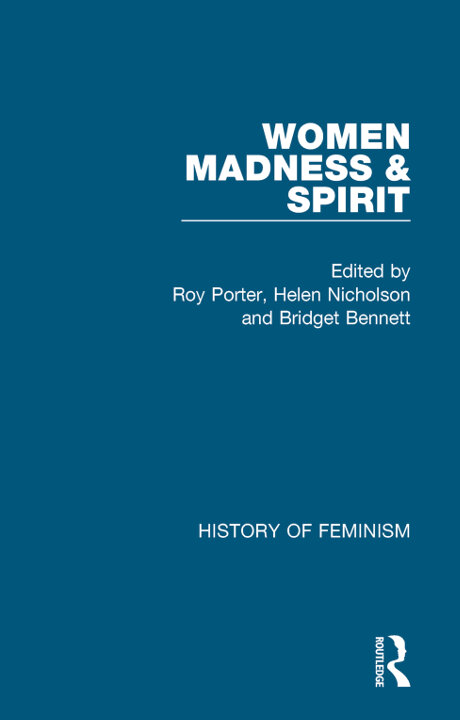Access to the full content is only available to members of institutions that have purchased access. If you belong to such an institution, please log in or find out more about how to order.
Loading content
We were unable to load the content

Women, Madness and Spiritualism
- Edited by
- Roy Porter
- Helen Nicholson
- Bridget Bennett
- Published: 11 Nov 2004
- DOI: 10.4324/9780415276337
- Set ISBN: 9780415276337
This set reproduces seminal writings by three exceptional nineteenth-century women. Georgina Weldon, Louisa Lowe and Susan Willis Fletcher were certified as insane by the Victorian medical establishment and were threatened with incarceration for their eccentric and transgressive behaviour. All three were remarkably resourceful and very successfully manipulated the sensationalist press to expose the 'lunacy laws' to the late-Victorian public. In doing this, they contributed to the emerging feminist critique of medicine and science. Each volume is devoted to the work of one of these exceptional women.
New introductions by the editors and the late Roy Porter provide context and discussion of the pieces included, pointing to the themes and issues that they raise. With an extensive index, this collection provides an invaluable resource for those studying the role of feminism in the history of medicine and the power of the medical profession in the Victorian era.
Set Contents
There were certain women in late Victorian Britain, notably the early suffrage campaigners, who programmatically challenged the traditional place of woman and developed gender politics campaigns. Alongside such ‘new women’, however, there were others who staked claims for justice and rights for women, not from some deep philosophical conviction but because that role had been thrust upon them by force of circumstance. One such, driven to action by bitter personal experience, was Georgina Weldon.
Towards the end of Twelve Months in an English Prison, Susan Willis Fletcher describes the sense of compulsion that drove her to write her narrative as soon as she had finished serving her prison sentence. She writes, ‘Every morning, from six o’clock to nine, I worked upon this story of my life, and my recent experiences, which I wished to record while fresh in my memory’ (p. 408). Read on its own, this seems like a conventional autobiographical sentiment that might come out of the memoirs of many a woman of the period who had some experience of public life and believed her life worthy of public inspection. Yet this is at odds with the book’s title that promises drama of a different order. Furthermore, the staggeringly blunt and frank first sentence of the book goes wholly against the notion of conventional middle-class female autobiography and throws the reader into an episode of nineteenth-century sensation that involved lack of convention at a whole range of levels: religious; sexual; social; gender. Fletcher writes, ‘In the summer of 1880, while visiting my mother in the United States, I was arrested on a charge of obtaining jewels and clothing of great value, by undue influence or false pretences, from a lady known as Mrs. Juliet Anne Theodora Heurtley Rickard Hart-Davis’ (p. 1). Her first arrest, as the book shows, took place while she was in the United States, though the case was dismissed when Hart-Davis left the country and returned to Britain before it came to court. It was her second arrest, which took place when Fletcher crossed the Atlantic to face charges made against her in Britain, that led to her imprisonment and to wide international coverage in the spiritualist and non-spiritualist press. The book describes her trial and imprisonment, but also her international career as a professional spiritualist medium and lecturer.